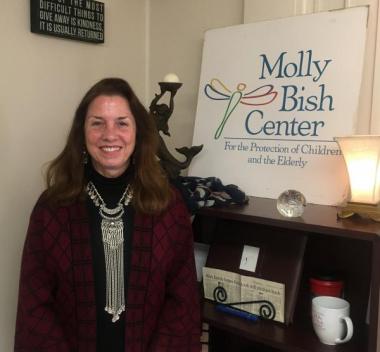
So I have many anthropologist friends that could never work with the families. One of the—I think one of the reasons people are attracted to archeology and anthropology is because you don’t actually have to talk to people. And you’re sort of behind the scenes. And I never minded, as an anthropologist, getting along with people is an important thing, but also understanding them. And so I have dealt with people from all different walks of life under the most horrific circumstances. And that was extremely important to me. And then to transfer that to this job, being director of the Molly Bish Center, it's extremely important that I understand the perspective of the victim, of the survivors that are left behind because they in fact are victims themselves, they’re just not deceased. And, you know, they’re the walking wounded. And when I was at the medical examiner’s office I couldn’t believe how many people had been impacted by that that you would never know just walking down the street. And so it became a very important part of who I am and what I did, but being able to translate that because I can get up in front of a professional audience at the American Academy of Forensic Science meetings and I can talk about skeletonized remains that are traumatized. I’ve done all sorts of trauma and had to explain that, on the stand as well as at professional meetings, intellectually. But viscerally, what happens when you’re in a courtroom, and you’re describing that. Like when I was in a courtroom for the Bulger testimony. Really, really hard to see the expressions of the families and to see their loved ones. They didn’t know where their loved ones were for sixteen to twenty years. And to be able to translate what I do into to telling that victim’s story and also doing it in a way that is respectful so that I’m keeping all of that in mind as the families are looking at me and some of them had to get up and leave, which I totally understand. And to be able to be a voice for those has been something that’s just—people say, “How can you do what you do?” and a lot of people don’t understand it. And that’s, that’s physical, that’s manual, you know, the nasty part of the decomposition. Yes, but that’s physical. It’s the emotional stuff and being humane and human and being professional is really important to me. And that we’re bringing these kids, these families—most important is bringing them home. And then telling their story.
Ann-Marie Mires was born in 1956, and grew up in a small town in Connecticut. After twenty-two years of education, she received a doctorate degree in anthropology. Since then, she has been involved with the Worcester community for many years through her work as a forensic anthropologist. During this interview, Ann-Marie discusses the struggles she encountered as a woman in the workforce, and how being a mother and a successful scholar is a difficult balancing act. She says, “And I was nursing my child and she said, “Now this,” she pointed to him, “This is going to be your great accomplishment, not that, your dissertation.” And I’ve always just tried to keep that in mind. Being a mother is actually more hard work than archeology.” She reflects upon the importance of family and the choices women are faced with when prioritizing their life in terms of family and career. Some highlights in her career include becoming the first forensic anthropologist for the state of Massachusetts, uncovering the remains of Whitey Bulger’s victims, and finding the body of Molly Bish. Currently, Ann-Marie serves as Director of the Molly Bish Center at Anna Maria College, program director of the Forensic Criminology program, and also works there as an adjunct professor. She also is director of a non-profit agency that’s mission is forensic archeology recovery with a focus on finding missing and never-been-found children who were abducted in the ‘70s, ‘80s, and ‘90s and she is the former Forensic Anthropologist for the Massachusetts Office of the Chief Medical Examiner.
